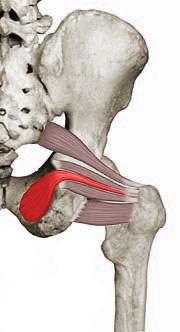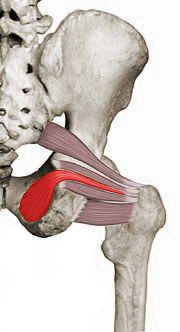If you’ve tried traditional exercises for hip pain with no results, it might be time to speak with a pelvic Physical Therapist. Your hip pain could be related to your pelvic floor!
Why?
Your pelvic floor muscles sit within the pelvis like a hammock. They support pelvic organs, aid in sexual function, and keep us leak-free. In addition to those great things, hip muscles are in there too.
In order for your body to move efficiently, your hip muscles, pelvic floor muscles, and core muscles should all be working together. Each group of muscles should be both strong and flexible. If you have tightness or weakness in one of these areas, your body may rely on other groups for movement or stability, eventually, causing dysfunction.
We tend to think more of our bigger, outer hip muscles like the glutes and hip flexors, but many are found deeper. For example, the obturator internus muscle has a direct connection between the pelvic floor and hip. It is an important stabilizer of the hip and shares a strong fascia connection with the floor. Because of this, it is a common cause of both pelvic floor dysfunction and hip pain. There is also an intricate system of nerves and connective tissue within the pelvis that can affect the low back, pelvic floor, and hips. Many nerves of the hip and pelvic floor both come from the same place.
The obturator internus muscle is one of six external rotators of the hip. Another external rotator, the piriformis muscle, is also a common problem with hip, SI joint, low lack and sciatic pain. It is so popular that it also gets the blame for a lot of other problems. As pelvic Physical Therapists, we have the advantage of being able to easily get to this muscle (and most others) internally and save you from having your PT or massage therapist digging an elbow in your butt.

What does deeper hip muscle pain feel like?
- Pain deep in the hip or low back
- Pain in or near the sit bone or tailbone
- Vaginal or rectal pain
- You might even have trouble pinpointing exactly what hurts.
Fai – Femoral acetabular Impingement (popping hip)
The Obturator Internus can be a major factor in hip dysfunction. It’s a common culprit in FAI – Femoral Acetabular Impingement. This is pain in the front of the hip, often with clicking or popping. People commonly report feeling a problem with the glutes, like they aren’t “activating” properly. Working on the obturator can make all the difference when FAI treatment and glute strengthening are not enough.
Pelvic floor dysfunction
Hip dysfunction can also be related to pelvic floor symptoms, such as urinary urgency, urinary incontinence, or sexual pain/dysfunction. Many of the hip muscles, especially your hip flexors, affect the position of your pelvis and spine. Improper positioning can affect the tightness and strength of your pelvic floor muscles. Read more about posture and the pelvic floor here!
What to do?
Because the hip and floor can be a “chicken and egg” situation, a proper assessment of the pelvic floor is just as important, if not more, than just assessment of the hip. A pelvic Physical Therapist will check all of these components to ensure that you are able to move functionally in a pain-free way.

